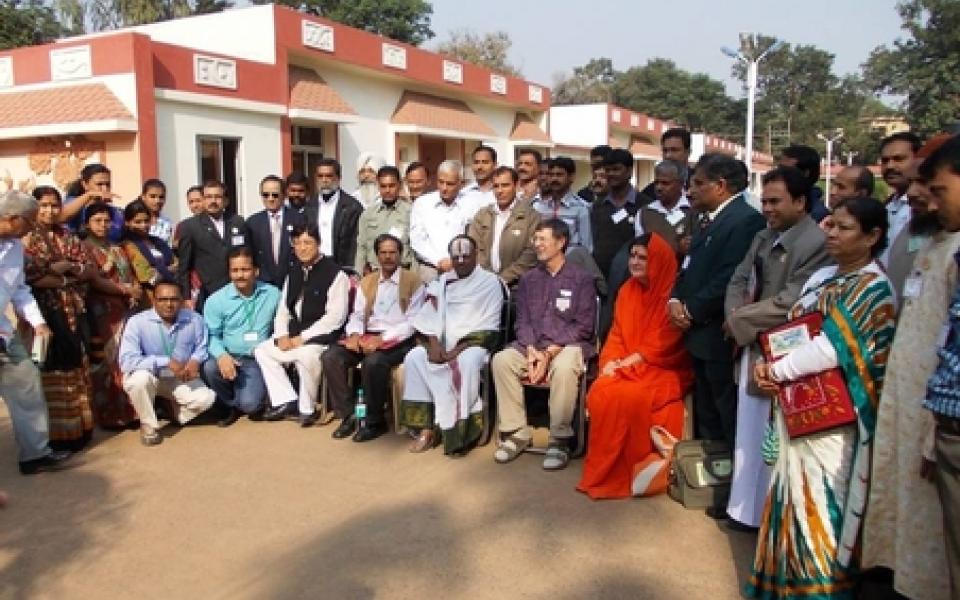
Dear Friends,
Greetings of love and peace from a guest house near Shantiniketan, home of the university developed by Rabindranath Tagore, the great Indian visionary, innovator and writer – the first person from outside Europe to win a Nobel Prize. Nearly 100 leaders from Cooperation Circles across India are here for the 3rd URI All India Assembly – Promoting Cultures of Peace.
I left San Francisco on Wednesday morning on a Singapore Airlines flight that landed me in Singapore at 4 a.m. Friday morning. By 7 p.m. that night, I was on another flight to Kolkata, where I was picked up at the airport by Vrajapati Das, a Global Council Trustee and disciple of Dr. T. D. Singh, a revered URI founding member and, sadly, for some years a member of URI’s Celestial CC, where he has joined other URI leaders who have left this world too soon. I was privileged to overnight in the last apartment Dr. Singh lived in before his passing.
At 2 p.m. this afternoon (Saturday), I left Kolkata with three URI URI colleagues (Vrajapati, Qutub Kidwai, west zone coordinator, and Sadhvi Adityananda Saraswati, a CC member from Rishikesh) for a four-hour drive to Shantiniketan, where we were greeted by Biswadeb Chakraborty, coordinator of the east zone who has provided a unifying leadership as coordinator of India; by his great team, who have labored hard to prepare for this assembly; and by enthusiastic URI members from all over India.
As long as my journey was, it was still slightly shorter than the train ride taken by our CC leaders from south India. I am awed and humbled by the dedication that leads volunteers to take a six-day round trip train journey to participate in a URI assembly.
The final segment of my trip will find me in the high mountain plateau state of Manipur, Dr. Singh’s birthplace, where we will be commemorating the 75thanniversary of his birth. Having traveled the length and breadth of India with Dr. Singh during URI’s chartering years, I am thrilled and honored to be present at this celebration of his life. I’m also delighted to return to the place that, in my mind, sparked a specific focus on developing URI’s capacity to help CCs become more effective as peacebuilders.
When I visited Imphal, Manipur in 2000, a few months before URI’s Charter was signed, I met with many members of what would soon become one of URI’s founding CCs. I was stunned when CC members began to quote passages from the not-yet-signed Charter. After quoting the Purpose, which calls all members of URI to promote enduring, daily interfaith cooperation, to end religiously motivated violence and to create cultures of peace, justice and healing for the Earth and all living beings, Radhamohan Das asked a fateful question: And what will URI do, he wanted to know, to help us end religiously motivated violence?
As I listened to that question, I instantly realized two things. It was a perfectly appropriate, essential question; and, I didn’t have nearly a good enough answer beyond, We’ll all have to figure this out together. As soon as I returned to our office in San Francisco, I asked Barbara Hartford if she would begin to explore ways we could build some organizational capacity in the peacebuilding area so we might have a better way to answer Radhamohan’s question.
So URI’s peacebuilding program began with a question here in India, the country that now boasts more CCs than the next two countries combined and more than any region except Asia. India is also home to the Traveling Peace Academy, anchored with great heart and expertise by Dr. Abraham Karickham, URI’s coordinator for India’s south zone.
I look forward to sending periodic postings as this trip unfolds. For now, I’ll end with this poem by Tagore:
Thou hast made me endless, such is thy pleasure.
This frail vessel thou emptiest again and again,
and fillest it ever with fresh life.
This little flute of a reed
thou hast carried over hills and dales,
and hast breathed through it melodies eternally new.
At the immortal touch of thy hands
my little heart loses its limits in joy
and gives birth to utterance ineffable.
Thy infinite gifts come to me
only on these very small hands of mine.
Ages pass, and still thou pourest,
and still there is room to fill.
Rabindranath Tagore
from Gitanjali
I pray this finds you all well.
Blessings,
Charles
The Rev. Charles P. Gibbs
Executive Director, United Religions Initiative
